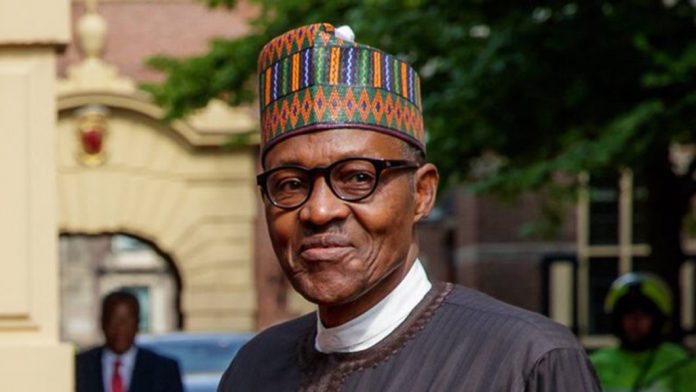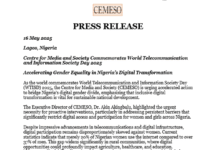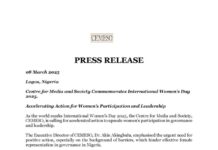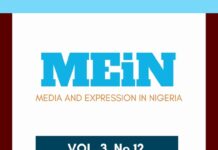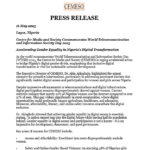Exhibiting increasing intolerance for the freedom of the press, the country’s security agencies have lately been attacking the media. In particular, the Nigeria Police Force is embroiled in a messy tango with an online newspaper, Premium Times. Special Anti-Robbery Squad officers detained three members of the organisation in Abuja. Popular governments draw their lifeblood from a free media. For the security agencies to turn on the media shows the apprehension in government ahead of the 2019 general election.
Fittingly, the assault on Premium Times has attracted global condemnation, casting the Muhammadu Buhari administration in a bad light. Coincidentally, it occurred on the same day Yemi Osinbajo, then the acting President, ordered the Inspector-General of Police, Ibrahim Idris, to reform SARS over its gross human rights violations. Premium Times said the police lured three employees of the news outfit to their office, where officers allegedly assaulted the editor-in-chief, Mojeed Musikilu; and detained a reporter, Azeezat Adedigba.
When officers finished with the duo, they descended on Samuel Ogundipe, their main target. Ogundipe had written a story about the invasion of the National Assembly on August 7 by State Security Service operatives, wherein he exposed the IG’s preliminary report on the incident that had indicted Lawal Daura, then the director-general of the secret police. Brimming with impunity, SARS officers asked Ogundipe to disclose his source. But he refused, just as every journalist worth his salt would. This provoked the officers.
However, democracy thrives on the freedom of the press. Section 29 of the 1999 Constitution also guarantees this global tenet that underpins a robust democratic practice. But when journalists overstep their bounds, there are enough sanctions for libel and other infringements in the statutes. Therefore, Ogundipe’s treatment by the police is unwarranted, a throwback to the pre-1999 days of military dictatorship.
Perhaps, the police are after Premium Times for its damaging exposés on the perceived misdemeanours of this government. In October 2017, the newspaper authored a story on Abdulrasheed Maina, a former chairman of the Presidential Reform Task Team. Although Maina was dismissed from the Civil Service in 2015 for allegedly stealing pension funds, he was reinstated by the Buhari administration. He had been declared wanted by the Economic and Financial Crimes Commission, but upon being illegally reinstated, was promoted. Premium Timesalso broke the story of the alleged certificate scandal of Kemi Adeosun, in July, alleging that the Finance Minister forged the National Youth Service Corps exemption certificate she presented when she was nominated for the post.
In a similar fashion, Jones Abiri, the publisher of Weekly Source (another online news medium), has just breathed the air of freedom after being detained by the SSS for the past two years. Although he is a publisher, he was accused of being a militant and threatening oil companies based in the Niger Delta. These cases have been charged to court, which is what the SSS and police should have done in the first place. By detaining Abiri for two years, his rights have been grossly violated.
Already, the media is battling to uphold the sanctity of journalism practice in the country after a bill to amend the Nigerian Press Council Act 1992 surfaced in the National Assembly. The amendment seeks to criminalise some aspects of journalism. Rightly, the Nigerian Press Organisation describes the new bill as a reincarnation of Decree No. 4 of 1984, with which two editors – Tunde Thompson and Nduka Irabor – were tried and jailed. This was during the military regime of Buhari as a head of state. Obviously, the security agents have not imbibed the culture of democracy.
Indeed, the Buhari administration needs to define how it deals with the media, especially with more tension ahead as the elections inch closer. Journalists in Kaduna State, including Midat Joseph of Abuja-based Leadership newspaper, have been experiencing tough times. Earlier this year, an obnoxious “Hate Speech Bill” was reluctantly thrown out of the parliament. The scheming did not stop there.
Lai Mohammed, the Minister of Information, has emerged as the arrowhead of the fresh campaign to discredit the media. At every opportunity, he labels news items as “fake news,” particularly on the social media. Yet, the social media has come to stay. Mohammed hid under the canopy of fake news last May during a town hall meeting where he blamed herdsmen killings on media reportage.
The minister ought to know that the journalists are only doing their constitutionally-assigned role of holding the government accountable. Perhaps, Mohammed is taking after American President Donald Trump, whose style is to belittle his country’s media as the purveyors of “fake, fake news.” To this, the United States media has responded: between August 21 and 22, 350 media outlets, in unison, called their president’s bluff by publishing the same editorial on Trump’s ranting.
Muzzling the media benefits no segment of the society. It is the antithesis of democracy. It kills off business, makes villains of practitioners and turns public office holders into brutal dictators. This is why we restate the immortal words of a former US president, Woodrow Wilson, to reinforce the essence of media practice. He said, “I can imagine no greater disservice to the country than to establish a system of censorship that would deny to the people of a free republic like our own their indisputable right to criticise their own public officials.” The Buhari government should, therefore, end his administration’s assault on the media.


